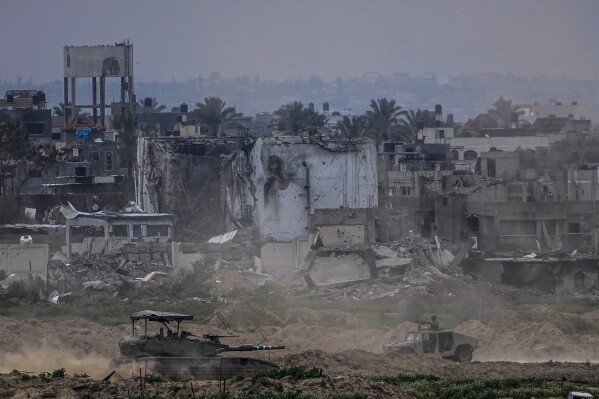How Russia's Zircon Hypersonic Missiles Will Impact Ukraine War
Russia fired a Zircon missile at Ukraine earlier this month, Kyiv has said, in what appears to be the first use of the hypersonic weapon in two years of war. But with a spotty track record for Moscow's vaunted, next-generation weapons, the impact of the Zircon's debut on the trajectory of the grueling war is murky.
On Monday, the head of Ukraine's state-backed Kyiv Scientific Research Institute of Forensic Expertise said Russia had used a Zircon, also known as Tsirkon, missile to attack the country on February 7.
"The missile was aimed at an area where there are no military facilities—civilian infrastructure and civilians were affected," Oleksandr Ruvin, the institute's director, said in a Telegram post, without giving further details.
The research organization analyzed missile fragments and components of the missile, although the missile's microelectronics were "poorly preserved," Ruvin said.
"Significant fragmentation of the missile makes identification difficult, but we can already say that the weapon does not meet the tactical and technical characteristics declared by the enemy," he added.
Colonel Yuriy Ihnat, a spokesperson for Ukraine's air force, told Newsweek on Wednesday that the use of a Zircon missile had been confirmed, and called for more U.S. Patriot air defense systems—known to intercept Russian hypersonic missiles—to protect Ukraine. It is not clear whether Russia will launch further Zircon missiles, he said.
Ukraine's air force had said on February 7 that Russia had launched air attacks overnight using several types of missiles, as well as strike drones.
Moscow launched 29 Kh-101, Kh-555 and Kh-55 cruise missiles from a number of Tu-95 strategic bombers, Kyiv said. It also launched three Kalibr missiles from vessels in the Black Sea, three Iskander-M ballistic missiles, five S-300 anti-aircraft guided missiles and four Kh-22 cruise missiles, the Ukrainian air force added.
Ukraine intercepted 26 of the Kh-101, Kh-555 and Kh-55 cruise missiles and all three Kalibr missiles, the air force said. It did not mention the use of hypersonic weapons, including the Zircon, at the time.
Russia has lauded the Zircon throughout its development. Russian sources have claimed it is capable of travelling at Mach 9, or nine times the speed of sound, for up to 1,000 kilometers (620 miles).
The Zircon was originally conceived as a hypersonic anti-ship missile, and Russia has been testing it from its frigates and submarines since 2020, said Mattias Eken, a defense and security analyst with the European branch of the RAND think tank.
"The rapid deployment and potential use of the missile is not entirely surprising, given Russia's quick move towards operationalizing it," he told Newsweek.
But it is important not to overestimate the significance of the apparent first use of the missile in Ukraine, Eken argued. "Russia has a history of exaggerating the capabilities of its weapons systems," he said.
Ukraine has repeatedly said it has shot down Russian Kinzhal missiles, another weapon Moscow has labeled as hypersonic.
"Tsirkon is a weapon that allows us to say that we can overcome any enemy defense," Boris Obnosov, the chief executive of the company that produces the missiles, told Russian state media in late January. But Western experts dispute this description, arguing it is not as invulnerable to air defenses as the Kremlin claimed.
Ukraine has said U.S.-made Patriot air defense systems have intercepted Kinzhal missiles launched at the country. However, the use of Zircons in Russia's war would "present a significant challenge" to Ukraine's air defense network, the U.K. government said on Wednesday.
The reported firing of a Zircon in Ukraine raises several unknowns about the missile. With few vessels known to carry Zircon missiles currently in the Black Sea, it is likely that a land-based Russian coastal defense system may have been adapted to launch it, the British Defense Ministry said. A land-attack version is also thought to be in development, Eken noted.
The Russian frigate, the Admiral Gorshkov, already carries Zircon missiles. Russia deployed the frigate on a "long-range sea voyage across the Atlantic and Indian Oceans, as well as the Mediterranean Sea," Russian Defense Minister, Sergei Shoigu, said in remarks reported by Russian state media in early January.
"The quick turnaround from testing and development to alleged operational use of Zircon also raises questions of whether it has overcome all developmental issues in such a short span of time," Eken argued.
Experts suggest Russia is likely test-driving the Zircon in an active conflict. Moscow has been experimenting with the makeup of its missile barrages against Ukraine, and it may be that it is probing how Kyiv's air defense network copes with hypersonic missiles, Eken said.
"It is likely the Russians are testing a newly operational weapon system in a live conflict environment to provide assurance and demonstrate capability," the U.K. Defense Ministry agreed on Wednesday.
But the development of Russia's Zircon stockpile will compete with resources that are sorely needed elsewhere, such as for rebuilding Russia's ground forces, Eken said. "As such, fielding the Zircon is unlikely to change Russia's immediate fortunes in its ongoing war."
Disclaimer: The copyright of this article belongs to the original author. Reposting this article is solely for the purpose of information dissemination and does not constitute any investment advice. If there is any infringement, please contact us immediately. We will make corrections or deletions as necessary. Thank you.

